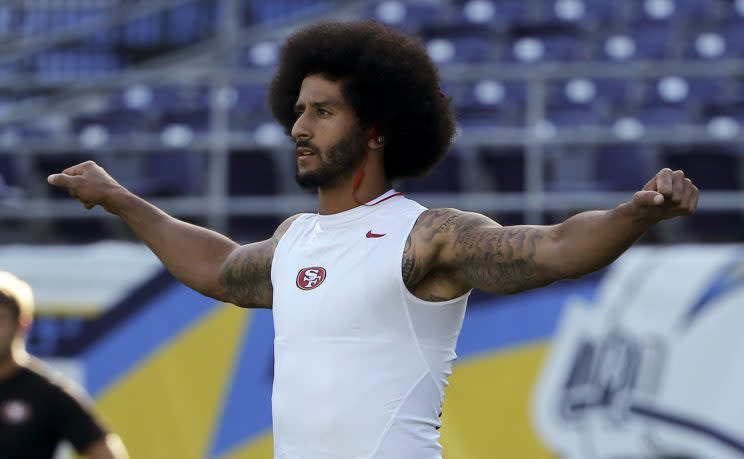Tupac, Sandra Bland prominent in Colin Kaepernick's sudden shift in awareness on social media
Colin Kaepernick’s protest came across to many football fans as sudden, almost out of nowhere. His decision to sit during the national anthem last weekend caused some speculation that he was staging a publicity stunt, a play for attention from a backup quarterback on the winding journey toward getting cut.
A look through his social media accounts, however, suggests his feelings on police behavior and the justice system developed a while ago.
[Sign up to play for free | Mock Draft now | Rankings | Draft Kit | Latest news]
Kaepernick hardly had a reputation for social awareness as recently as early 2015. Remember, it was the San Francisco quarterback who last May foolishly posted on Instagram a photo of the Houston floods with the caption, “I warned you the #7tormsComing!!! #Houston.” Kaepernick later apologized, saying, “I didn’t fully understand how many people are struggling in Houston right now.”
That summer, his social media tendencies began to shift.

Late in July, he retweeted a graphic video of a police officer shooting a black man after a dispute. “Police brutality is getting out of hand,” was the caption. Kaepernick also retweeted two posts related to Sandra Bland, a black woman who died in her jail cell three days after being pulled over in Texas for a minor traffic violation and getting into an argument with a police officer. Bland’s death, which was ruled a suicide, gave way to questions across the country and eventually protests. The arresting officer was placed on administrative leave and later indicted for perjury. To many, it didn’t make sense why Bland was pulled over in the first place, and why she might have taken her life. In the days after Bland’s death, Kaepernick retweeted an interview with Bland’s mother as well as a photo of a small card with instructions on what to tell police if pulled over.
[Related: Colin Kaepernick plans to pledge $1M to racial equality causes]
Over the rest of that summer, Kaepernick mostly filled his Twitter feed with posts about Nike gear, fans “Kaepernicking”, and his charity for children with heart disease, Camp Taylor. His Instagram account, however, showed a more noticeable trend. There was a “This Day in Black History” post in October about the Black Panther Party. A few weeks later, Kaepernick posted about a Chicago police raid in 1969 that ended in the shooting of two black men, one of whom was a member of the Black Panthers.
Two weeks after that, there were posts on Bland, including one with a photo of Bland next to that of Assata Shakur, a Black Panther member accused of killing a New Jersey State Trooper in 1973. There is a quote from Shakur in 1987 suggesting that “suspicious” deaths of black prisoners are often ruled suicides. Kaepernick’s caption is, “Either we have regressed or things have never changed!”
That same week, Kaepernick posted a quote from Ida B. Wells, one of the founders of the NAACP: “Those who commit the murders write the reports.” Kaepernick’s caption: “So much for checks and balances!”
As the weeks went on, into 2016, there were more Instagram posts along the same lines, with quotes from Martin Luther King and Malcolm X. “The greatest mistake of the movement,” reads one, “has been trying to organize a sleeping people around specific goals. You have to wake the people up first.” Another: “If you’re not careful, the newspapers will have you hating those who are oppressed, and loving the people who are doing the oppressing.”
Perhaps the most foretelling post came about three months ago, from Tupac Shakur, who said in an interview, “I’m not saying I’m going to rule the world or I’m going to change the world. But I guarantee I will spark the brain that will change the world.”
Shakur’s comments, like Malcolm X’s and even King’s, hint at action rather than simple reflection. The theme is challenging the status quo.
[Related: Who is Jeremy Lane, the ‘other’ national anthem protester?]
Over time, the frequency of Kaepernick’s sports posts continued to wane and the volume of political or issue-related posts grew. There have been many retweets of Shaun King, the New York Daily News writer who has been vociferous in his views of police behavior and brutality. There were also retweets of commentary and coverage of the recent conflict in Milwaukee, where Kaepernick was born.
For those who have been following current events, as Kaepernick clearly has, there have been more than a few police-related incidents that have caused consternation and anger. The names Freddie Gray, Eric Garner, Laquan McDonald, Michael Brown, Tamir Rice, Anton Sterling and Jamar Clark are widely recognized now. It can be argued that police brutality is less than it has been in the past, but it can also be argued that social media and video have only recently shed a light on a pattern of tragedies that happened continually and were lost in history (or covered up).
It’s impossible to know without an in-depth discussion with Kaepernick how rapidly his feelings changed or evolved or grew. There were likely contributing factors only he knows. During a recent interview with reporters, he said during college he and his roommates “had guns drawn on us.” Whatever the root causes, it’s hard to argue that this was an overnight transformation. For Kaepernick, as well as many who care about the issues he’s raising, the emotions have been building for a while.
Related NFL video on Yahoo Sports:


